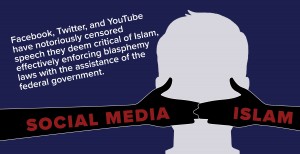 On July 13, 2016, the American Freedom Law Center (AFLC) filed a federal lawsuit in the U.S. District Court for the District of Columbia, challenging Section 230 of the Communications Decency Act (CDA) under the First Amendment.
On July 13, 2016, the American Freedom Law Center (AFLC) filed a federal lawsuit in the U.S. District Court for the District of Columbia, challenging Section 230 of the Communications Decency Act (CDA) under the First Amendment.
Section 230 provides immunity from lawsuits to Facebook, Twitter, and YouTube, thereby permitting these social media giants to engage in government-sanctioned censorship and discriminatory business practices free from legal challenge.
The lawsuit was brought on behalf of the American Freedom Defense Initiative (AFDI), Pamela Geller, Robert Spencer, and Jihad Watch.
As alleged in the lawsuit, Geller and Spencer, along with the organizations they run, are often subject to censorship and discrimination by Facebook, Twitter and YouTube because of Geller’s and Spencer’s beliefs and views, which Facebook, Twitter, and YouTube consider expression that is offensive to Muslims.
Such discrimination, which is largely religion-based in that these California businesses are favoring adherents of Islam over those who are not, is prohibited in many states, but particularly in California by the state’s anti-discrimination law, which is broadly construed to prohibit all forms of discrimination. However, because of the immunity granted by the federal government, Facebook, Twitter, and YouTube are free to engage in their otherwise unlawful, discriminatory practices.
As set forth in the lawsuit, Section 230 of the CDA immunizes businesses such as Facebook, Twitter, and YouTube from civil liability for any action taken to “restrict access to or availability of material that” that they “consider[] to be obscene, lewd, lascivious, filthy, excessively violent, harassing, or otherwise objectionable, whether or not such material is constitutionally protected.”
Thus, Section 230 confers broad powers of censorship upon Facebook, Twitter, and YouTube officials, who can silence constitutionally protected speech and engage in discriminatory business practices with impunity by virtue of this power conferred by the federal government in violation of the First Amendment.
Section 230 is a federal statute that alters the legal relations between our clients and Facebook, Twitter, and YouTube, resulting in the withdrawal from our clients of legal protections against private acts. Consequently, per U.S. Supreme Court precedent, state action lies in our clients’ constitutional challenge.
As set forth in the lawsuit, Facebook, Twitter, and YouTube have notoriously censored speech that they deem critical of Islam, thereby effectively enforcing blasphemy laws here in the United States with the assistance of the federal government in violation of the First Amendment.
CASE UPDATE (October 11, 2016): AFLC filed its response to the government’s motion to dismiss.
CASE UPDATE (November 9, 2016): the district court dismissed our lawsuit, claiming that our clients lack standing.
CASE UPDATE (November 14, 2016): we are appealing the district court’s decision to the U.S. Court of Appeals for the D.C. Circuit.
CASE UPDATE (March 6, 2017): we filed our opening brief in the D.C. Circuit.
CASE UPDATE (May 18, 2017): we filed our reply brief in the D.C. Circuit.
CASE UPDATE (September 15, 2017): The DC Circuit summarily affirmed the lower court’s dismissal of our lawsuit on standing grounds. Per the rulings in this case, a private party cannot sue the government when it grants immunity to third parties when that immunity provision allows the third parties to violate the challenger’s rights. Sad day.
